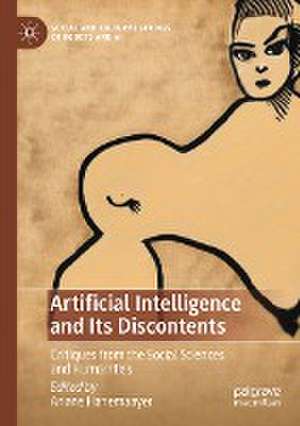Artificial Intelligence and Its Discontents: Critiques from the Social Sciences and Humanities: Social and Cultural Studies of Robots and AI
Editat de Ariane Hanemaayeren Limba Engleză Paperback – 3 feb 2023
and implementation across the globe? This book answers this question by
drawing on a range of critical approaches from the social sciences and humanities,
including posthumanism, ethics and human values, surveillance studies, Black
feminism, and other strategies for social and political resistance. The authors
analyse timely topics, including bias and language processing, responsibility
and machine learning, COVID-19 and AI in health technologies, bio-AI and
nanotechnology, digital ethics, AI and the gig economy, representations of AI in
literature and culture, and many more. This book is for those who are currently
working in the field of AI critique and disruption as well as in AI development and
programming. It is also for those who want to learn more about how to doubt,
question, challenge, reject, reform and otherwise reprise AI as it been practiced
and promoted.
| Toate formatele și edițiile | Preț | Express |
|---|---|---|
| Paperback (1) | 724.32 lei 6-8 săpt. | |
| Springer International Publishing – 3 feb 2023 | 724.32 lei 6-8 săpt. | |
| Hardback (1) | 729.53 lei 6-8 săpt. | |
| Springer International Publishing – 2 feb 2022 | 729.53 lei 6-8 săpt. |
Preț: 724.32 lei
Preț vechi: 883.31 lei
-18% Nou
Puncte Express: 1086
Preț estimativ în valută:
138.60€ • 145.37$ • 115.38£
138.60€ • 145.37$ • 115.38£
Carte tipărită la comandă
Livrare economică 01-15 aprilie
Preluare comenzi: 021 569.72.76
Specificații
ISBN-13: 9783030886172
ISBN-10: 3030886174
Pagini: 275
Ilustrații: XV, 275 p. 6 illus., 4 illus. in color.
Dimensiuni: 148 x 210 mm
Greutate: 0.35 kg
Ediția:1st ed. 2022
Editura: Springer International Publishing
Colecția Palgrave Macmillan
Seria Social and Cultural Studies of Robots and AI
Locul publicării:Cham, Switzerland
ISBN-10: 3030886174
Pagini: 275
Ilustrații: XV, 275 p. 6 illus., 4 illus. in color.
Dimensiuni: 148 x 210 mm
Greutate: 0.35 kg
Ediția:1st ed. 2022
Editura: Springer International Publishing
Colecția Palgrave Macmillan
Seria Social and Cultural Studies of Robots and AI
Locul publicării:Cham, Switzerland
Cuprins
Chapter 1: Introduction: Critical Insights: Bringing the social sciences and humanities to AI.- Section I: Posthumanism.- Chapter 2: Virtually Grown Up: Artificial Intelligence in Youth Fiction.- Chapter 3: The Feminized Robot: Labour and Harawayan Afterlives.- Section II: Human values.- Chapter 4: AI’s fast and furtive spread by infusion into technologies that are already in use – a critical assessment.- Chapter 5: Dumbwaiters & Smartphones: The Responsibility of Intelligence.- Section III: Media and Language.- Chapter 6: Artificial Intelligence: a medium that hides its nature.- Chapter 7: Gender Bias in Machine Translation Systems.- Section IV: Governance.- Chapter 8: Not Anytime Soon: The clinical translation of nanorobots.- Chapter 9: Controversial Covid-19 contact-tracing app in India: digital self-defence, governance and surveillance.- Chapter 10: Intelligent Justice’: AI Implementations in China's Legal Systems.- Section V: Resistance.- Chapter 11: Artificial Intelligence between Oppression and Resistance: Black Feminist Perspectives on Emerging Technologies.- Chapter 12: AI Ruined the Internet – and Everything Else: A manifesto.- Index.
Recenzii
“The book offers a number of useful critiques of AI as it interacts with increasing numbers of Internet users. Readers should take the Marxist perspectives with a grain of salt.” (G. R. Mayforth, Computing Reviews, October 19, 2022)
“All of the chapters are well written and the editorial process was clearly very good. … I found four essays particularly noteworthy … . If you are limited on time, these core essays are must-reads. I found this book interesting because it disclosed to me what others outside the computational science community see.” (Anthony J. Duben, Computing Reviews, July 20, 2022)
Notă biografică
Ariane Hanemaayer is Associate Professor at Brandon University and Visiting Scholar at the Centre for Research in Arts, Social Sciences and Humanities at the University of Cambridge. She is also Author of The Impossible Clinic: A critical sociology of evidence based medicine.
Textul de pe ultima copertă
This book answer this below question by drawing on a range of critical approaches across the social sciences and humanities, including posthumanism, ethics and human values, media and communications, linguistics, governance and justice studies, surveillance studies, Black feminism, and social and political resistance. On what basis can we challenge Artificial Intelligence (AI)―its infusion, investment, and implementation across the globe? . The authors analyse timely topics, including bias and language processing, responsibility and machine learning, COVID-19 and AI in health technologies, bio-AI and nanotechnology, digit ethics, AI and the gig economy, and representations of AI in literature and culture. This book is for those who are currently working in the field of AI critique and disruption. It is also a book for those who want to learn more about how to doubt, question, challenge, reject, reform and otherwise reprise “AI” as it has been practiced and promoted.
Ariane Hanemaayer is Associate Professor at Brandon University and Visiting Scholar at the Centre for Research in Arts, Social Sciences and Humanities at the University of Cambridge. She is also Author of The Impossible Clinic: A critical sociology of evidence based medicine.
Ariane Hanemaayer is Associate Professor at Brandon University and Visiting Scholar at the Centre for Research in Arts, Social Sciences and Humanities at the University of Cambridge. She is also Author of The Impossible Clinic: A critical sociology of evidence based medicine.
Caracteristici
Draws on a range of critical approaches across the social sciences Analyses timely topics, including bias and language processing, responsibility and machine learning COVID-19 An invaluable reference for those working in the field of AI critique and disruption









